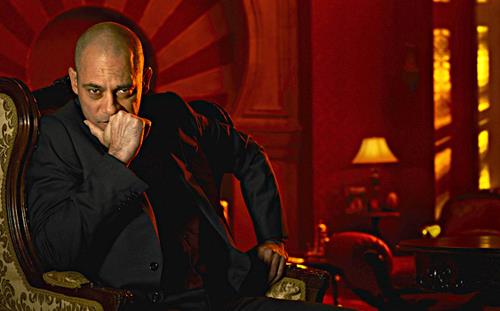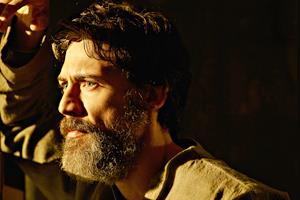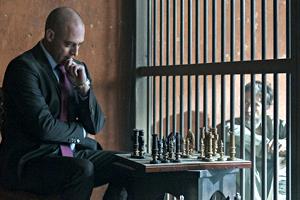
Tyrant, FX’s morally ambitious drama about Machiavellian intrigue and family politics in the fictional Mideast dictatorship of Abbudin, returns for a 13-episode second season Tuesday, in a long-shot bid for better ratings and a possible third season.
Tyrant has a rough road ahead of it. When viewers last saw Barry Al-Fayeed, the entitled, holier-than-thou, American-raised younger brother of a Mideast dictator, he was cooling his heels in prison, outed for plotting a coup against his tyrannical older brother, Jamal.
 The show is set up so that viewers will root for Barry — its either him or his dictator brother, after all — but it doesn’t help that the actor playing Barry, Adam Rayner, (right) seems wholly inadequate to the role, whereas the actor playing the villainous Jamal, Galilee-born Israeli Arab actor Ashraf Barhom, (top) practically oozes charisma from every pore. It’s a rule of fiction that every good yarn needs a strong villain, but perhaps not when the villain is so charismatic, he overwhelms the hero at every turn.
The show is set up so that viewers will root for Barry — its either him or his dictator brother, after all — but it doesn’t help that the actor playing Barry, Adam Rayner, (right) seems wholly inadequate to the role, whereas the actor playing the villainous Jamal, Galilee-born Israeli Arab actor Ashraf Barhom, (top) practically oozes charisma from every pore. It’s a rule of fiction that every good yarn needs a strong villain, but perhaps not when the villain is so charismatic, he overwhelms the hero at every turn.
From the beginning, producers Howard Gordon, Craig Wright and original series creator Gideon Raff wanted a surface sense of reality, at the very least. They opted to film Tyrant in Israel — portions of the pilot were filmed in Morocco — rather than a back lot in Burbank, as many US-based but foreign-set dramas do.
Gordon and the Israeli-born Raff had similar ambitions for Homeland, which won a best drama Emmy in its first season. Entire episodes in Homeland’s first two seasons were filmed in Israel. Filming has since settled on Cape Town, South Africa as a location — though the story again is set somewhere else, somewhere more genuinely Middle Eastern.
Ambition is a good thing in TV. Most primetime TV, after all, takes the easy out. As network executive keep reminding critics, reviewers and anyone who’ll listen, TV is a business. It’s easier and more cost-effective to shoot in Burbank than a potential conflict zone, many time zones away and across countless international borders. As it is, Tyrant was forced to uproot location filming to Istanbul from Tel Aviv in the middle of last summer, after war broke out in Gaza. FX’s leap of faith — quality over expedience — looked for a moment there as if it was going to backfire big-time.
Away from the set, Tyrant found itself in the eye of another controversy, some would say of its own making. Tyrant, along with Homeland and other dramas, found themselves the focus of a growing backlash from the Arab-American community about TV’s clichéd, stereotypical depiction of Muslims in general, and Middle East turmoil in particular.
Homeland was singled out for special attention in an impassioned and emotionally charged essay last October in the Washington Post by the New York-based writer and activist Laura Durkay.
“The entire structure of Homeland,” Durkay wrote, “is built on mashing together every political manifestation of political Islam, Arabs, Muslims and the whole Middle East into a Frankenstein-monster global terrorist threat that simply doesn’t exist.”
Pakistan born, Harvard educated novelist Bina Shah, who writes in English even though she lives in her birth city of Karachi, echoed Durkay’s concerns in a New York Times op-ed piece later that month.
 “Hollywood isn’t known for historical accuracy or impartial portrays of any fictionalized ‘other,’” Shah wrote. “But I still couldn’t resist trying to see what Pakistan, my homeland, looked like through its eyes.”
“Hollywood isn’t known for historical accuracy or impartial portrays of any fictionalized ‘other,’” Shah wrote. “But I still couldn’t resist trying to see what Pakistan, my homeland, looked like through its eyes.”
She found Homeland to be seriously wanting in that respect.
Tyrant is an entirely different series, of course — a different story set against a different fictional backdrop.
It’s intended for a similar audience, though — educated, upscale viewers who want something more nuanced and meaningful from Mideast-based thrillers than anything they might see in a typical episode of NCIS, Madam Secretary, or American Odyssey for that matter.
To the producers’ credit, they want Homeland and Tyrant to be taken seriously.
And the best way to be taken seriously is to create something that feels real, even if, strictly speaking, it isn’t real.
Criticism from the Council on American-Islamic Relations (CAIR), among others, stung, even if Homeland and Tyrant’s makers felt the criticism was misplaced.
FX went so far as to present a panel of Arab-American advocacy groups at last summer’s meeting the Television Critics Association in Beverly Hills. The panel included a pair of Syrian and Egyptian-born activists who demonstrated in street protests during the Arab Spring; Salam Al-Marayati, president of the Muslim Public Affairs Council and a creative consultant on Tyrant; Michael Wolfe, co-director of Muslims on Screen and Television (MOST); and Cynthia Schneider, a former U.S. ambassador to the Netherlands and professor of diplomacy and foreign affairs at Washington, D.C.’s Georgetown University, alongside Tyrant and Homeland producer Howard Gordon,
 The panelists tackled everything from the defining image in Homeland’s publicity poster — in Durkay’s words, showing “a blonde, white Red Riding Hood lost in a forest of faceless Muslim wolves” — to the optics of casting an Americanized English actor — Rayner was born in Shrewsbury, UK and was cast as Simon Templar in Roger Moore’s would-be reboot of The Saint before Tyrant came along — as a character of clearly Middle Eastern descent.
The panelists tackled everything from the defining image in Homeland’s publicity poster — in Durkay’s words, showing “a blonde, white Red Riding Hood lost in a forest of faceless Muslim wolves” — to the optics of casting an Americanized English actor — Rayner was born in Shrewsbury, UK and was cast as Simon Templar in Roger Moore’s would-be reboot of The Saint before Tyrant came along — as a character of clearly Middle Eastern descent.
An issue as thorny and complex as U.S. TV’s depiction of Muslims and Islamic nation states can’t be decided in an hour of debate, of course, but some salient facts emerged just the same. As Tyrant returns for a second season — and Homeland lays the ground for its fifth season this fall — it’s worth revisiting some of what was said that day.
“We recognize that this is a TV drama, not a documentary,” Schneider said. “Still, the real-life stories are not always accessible in the press.”
Yaacoub, former head of Egypt’s Naguib Soiree political movement and now assistant director of the Tahrir Institute on Middle East Policy, said Tyrant was better than he expected.
“After reading the reviews, I thought it was going to be horrendous,” Yaacoub said. “But it wasn’t. It needs some tweaking, There are some thematic problems with the show here and there, but that doesn’t mean the entirety of the show is off-balance. That was my impression, anyway.”
Al-Marayati found Tyrant to be well-intended, for all its flaws.
“I think that with any show that deals with tyranny in the Middle East, if it can humanize people’s struggle against tyranny and oppression, it will be good in the end,” Al-Marayati said. “The story of tyranny has not been told. In America, we view tyrants in the Middle East as a product of culture and religion, but it goes beyond that. It’s much deeper than that. There’s a history of tyranny in the Middle East. There’s a history of Western support for tyrants in the Middle East. I view a story about how people deal with that struggle, and how religion can play a positive role, as an opportunity. Howard (Gordon) has produced a creative show. He’s obviously sensitive and educated about the complexities.
“But at the end of the day, when you’re trying to do something that is entertaining, these nuances can get lost. I do think this was a good effort. But against the backdrop of everything else that’s done in Hollywood, where it’s only about terrorism, it’s only about violence, it’s only about abusing women, yes, I can see where where other organizations and groups may feel this is another slap in the face.”
“This is a dramatic television program,” one-time U.S. ambassador Schneider said. “As a professor, why do I do this? Why am I involved in this? Because for the audience, Americans who have no direct experience of this part of the world, it’s important that it feel real. I have many friends who have said this is real. This is the Middle East. They see this as representing the Middle East. It’s important that Howard takes this seriously. It’s important, as much as is possible within the context of the story, to get it right.”
Wolfe, another consultant on Tyrant, revealed that, early in the series’ development, FX boss John Landgraf admitted Tyrant wasn’t going to be perfect, but that it would be a learning experience for all involved.
“This is a process,” Gordon admitted. “We responded as well as we can.”
Beginning with Tyrant’s second-season debut, the audience will once again have final say over whether he succeeded or not.